|
|
|
Sort Order |
|
|
|
Items / Page
|
|
|
|
|
|
|
| Srl | Item |
| 1 |
ID:
103683
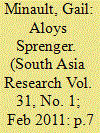

|
|
|
|
|
| Publication |
2011.
|
| Summary/Abstract |
Aloys Sprenger (1813-1893) was an Austrian scholar with a medical degree who joined the British East India Company's medical service in order to pursue in India his real passion, the study of oriental literatures. He became the Principal of Delhi College in 1845, and presided over an experiment in learning at Delhi College, an institution that taught both eastern and western literatures and sciences through the medium of Urdu. The college attempted to bring about a creative synthesis of the two curricula, via an active programme of translation and publication. Sprenger helped launch a series of scholarly journals published by the college, thus contributing to the dissemination of knowledge and the nurturing of a group of students and faculty with whom he maintained an active correspondence after leaving the college. This collection of letters has not been adequately evaluated earlier as an indication of the collaboration between western and Indian intellectuals in the period before the revolt of 1857. Most accounts of Sprenger's contributions to Delhi College have been laudatory. There was, however, a darker side to Sprenger's stewardship that deserves elucidation. Based on archival research, the present article seeks to evaluate Sprenger's ambiguous intellectual legacy to Delhi College and to the evolution of education in British India.1
|
|
|
|
|
|
|
|
|
|
|
|
|
|
|
|
| 2 |
ID:
172229
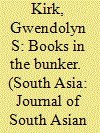

|
|
|
|
|
| Summary/Abstract |
Under United States Public Law 480, a major hallmark of Cold War diplomacy, India received millions of dollars in loans from the US during the 1950s and 1960s in the form of food and agricultural products. A portion of the interest due on this loan was repaid by India partly in the form of books in about two dozen languages which were collected from across South Asia and sent to the Library of Congress and several universities in the country during the heyday of the development of Area Studies. The object of this paper is a large deposit of written material—books, periodicals and ephemera—that was sent to the University of Texas at Austin over a period starting in the 1960s under the PL 480 programme. Most of these materials were added to the library collections, but a large number of them remained uncatalogued for about fifty years in an underground library storage facility in downtown Austin. The history of these materials, and the moment when they reappeared provides a case study of how books are appropriated (or not) into academic, library and political assemblages, and the way disciplines and their canons have been shaped by politics and infrastructure from the Cold War into the neo-liberal age.
|
|
|
|
|
|
|
|
|
|
|
|
|
|
|
|
| 3 |
ID:
172226
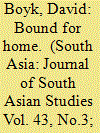

|
|
|
|
|
| Summary/Abstract |
At the turn of the twentieth century, a group of young men in Desna, a qasba (small town) in Bihar, founded an organisation called the Anjuman Al-Islah. There they shared their books in the name of promoting education and cultivation, which they saw as ‘paramount in life’s every undertaking’ and essential to the defence of qasbati culture. Through sustained collaborative efforts, the Anjuman soon built up an impressive library of Urdu books and periodicals. Where other libraries were assembled at the initiative of aristocratic patrons or government officials, the Al-Islah library relied on the contributions of numerous Desnavis, both those who still lived in the qasba and those whose careers had taken them far away. In turn, the Anjuman and its library nurtured Desnavis’ ties to each other and to their watan, or homeland.
|
|
|
|
|
|
|
|
|
|
|
|
|
|
|
|
| 4 |
ID:
042092


|
|
|
|
|
| Publication |
London, Seminar Press, 1971.
|
| Description |
v,214p.
|
| Standard Number |
0-12-815550-7
|
|
|
|
|
|
|
|
|
|
|
|
Copies: C:1/I:0,R:0,Q:0
Circulation
| Accession# | Call# | Current Location | Status | Policy | Location |
| 008228 | 020.0950/CHA 008228 | Main | On Shelf | General | |
|
|
|
|
| 5 |
ID:
042329


|
|
|
|
|
| Publication |
New York, John Wiley and Sons, 1972.
|
| Description |
xiii, 250p.
|
| Standard Number |
047184831X
|
|
|
|
|
|
|
|
|
|
|
|
Copies: C:1/I:0,R:0,Q:0
Circulation
| Accession# | Call# | Current Location | Status | Policy | Location |
| 009669 | 027/TAY 009669 | Main | On Shelf | General | |
|
|
|
|
| 6 |
ID:
184798


|
|
|
|
|
| Summary/Abstract |
South Asian collections in the West have complex histories. Usually started at the time of colonial rule and built on practices of acquisition, they often involved the removal of manuscripts and books from the subcontinent with little or no compensation to the owners. This in turn created gaps in knowledge locally. While following the founding of the independent, post-colonial nation-states, acquisition practices changed, a culture of coloniality continued through book exchanges and the classification system rooted in Western frameworks of knowledge and colonial mindsets. Moreover, for scholars outside the physical libraries, there are barriers to access the collections. Looking at current library practices, and with University of Wisconsin-Madison’s collections as a case study, this article outlines some historical problematics and points towards new directions in working toward decolonising the library.
|
|
|
|
|
|
|
|
|
|
|
|
|
|
|
|
| 7 |
ID:
172227
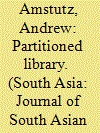

|
|
|
|
|
| Summary/Abstract |
This article argues that the history of a damaged Urdu library in Delhi reveals new perspectives on the ways in which prominent Indian Muslim scholars dealt with the violent displacements of the 1947 Partition of British India and imagined new futures for the Urdu language across the borders of India and Pakistan. The library of the Anjuman-e Taraqqi-e Urdu (Association for the Advancement of Urdu), an influential Urdu literary association, was damaged during the violence following Partition in August 1947. In contrast to the relative absence of official commemorations of Partition in post-colonial South Asia, the Anjuman’s leaders documented and publicised the violence of Partition on their library. Moreover, these Urdu scholars used the material process of restoring the damaged library in 1947 and 1948 to rethink the role of the library as a repository to preserve evidence of the continuing production of Urdu knowledge in India. In turn, the disputed division of the library in 1949 illuminates competing visions for Urdu’s future in India, Pakistan, and beyond. This story of one Urdu library demonstrates how changing library collecting priorities and material practices shaped broader debates over Urdu’s place in twentieth-century South Asia.
|
|
|
|
|
|
|
|
|
|
|
|
|
|
|
|
| 8 |
ID:
172225


|
|
|
|
|
| Summary/Abstract |
This article traces the fortunes of one of India’s great libraries, which Tipu Sultan of Mysore amassed largely through plunder and which the British East India Company plundered in turn. It shows how Tipu used the library to legitimise his authority and how rival factions of the Company, after defeating him in 1799, did the same. The article links the figuration of loot in the subcontinent, as studied by historians of material culture, to the conceptualisation of British India, as studied by historians of political thought. More broadly, it attests the symbolic power that plunder had—perhaps still has—to confer prestige.
|
|
|
|
|
|
|
|
|
|
|
|
|
|
|
|
| 9 |
ID:
042106


|
|
|
|
|
| Publication |
New Delhi, Ess Ess Publications, 1985.
|
| Description |
viii, 202p.
|
| Standard Number |
81-7000-010-6
|
|
|
|
|
|
|
|
|
|
|
|
Copies: C:1/I:0,R:0,Q:0
Circulation
| Accession# | Call# | Current Location | Status | Policy | Location |
| 025989 | 027.454/SHA 025989 | Main | On Shelf | General | |
|
|
|
|
| 10 |
ID:
165935
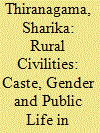

|
|
|
|
|
| Summary/Abstract |
This essay investigates how public life in Kerala is shaped by spatially distributed gendered caste practices. The essay first investigates rural publics, such as rural libraries, and suggests that forms of progressive civility in seemingly caste-free associational publics should be understood not as the elimination of caste practices but their reconstitution. Second, while it is commonly accepted that caste is naturally practised in the ‘private’, I suggest that these ‘privates’ are in fact what I call a ‘private–public’ and are spatially and socially shaped by gender and caste. I argue that ideas of civility and democracy need to understand experiences of forms of civility and incivility as constituted in private–publics rather than only in the formal associational public.
|
|
|
|
|
|
|
|
|
|
|
|
|
|
|
|
| 11 |
ID:
129001
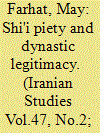

|
|
|
|
|
| Publication |
2014.
|
| Summary/Abstract |
Mashhad, the site in northeastern Iran of the shrine of the eighth Shi?i imam, is arguably one of the largest and wealthiest sacred shrines in the world. The gilded dome over the imam's mausoleum stands amidst an expansive complex of courts, monumental gateways, libraries, museums, guesthouses, and administrative offices that cater to thousands of pilgrims each year. This paper examines the period, under the aegis of the early Safavid shahs, when Mashhad was established as the preeminent Shi?i pilgrimage center in Iran. Appropriating the Timurid ecumenical vision for the shrine, the Safavid shahs refashioned the holy city into a site that celebrated the triumph of Twelver Shi?ism in the Safavid realm and reinforced Safavid claims of legitimacy. While highlighting Shah Tahmasb's personal devotion to Mashhad, and his privileging of the shrine within Safavid sacred topography, the paper focuses on Shah ?Abbas's urban reshaping of Mashhad and the architectural and institutional expansion of the shrine during his reign, thereby enhancing its status as the leading spiritual center in the Safavid empire.
|
|
|
|
|
|
|
|
|
|
|
|
|
|
|
|
| 12 |
ID:
188656


|
|
|
|
|
| Summary/Abstract |
During the First World War, American War Department officials and their welfare affiliates (including the YMCA, Knights of Columbus, and American Library Association) provided servicemen with an unprecedented scale and scope of leisure activities by embracing new distribution and management approaches. Historians examining troops' leisure have focused on bureaucrats’ coercive actions restricting access to vice districts, but progressive authorities also hired staffers who could identify individual soldiers' preferences and construct complex distribution networks on both sides of the Atlantic. By examining the military’s role in blurring public–private boundaries in welfare work, administrators’ postwar careers, and veterans’ expectations, this article illustrates wartime recreation programs’ impact on the development of mass culture.
|
|
|
|
|
|
|
|
|
|
|
|
|
|
|
|
|
|
|
|
|